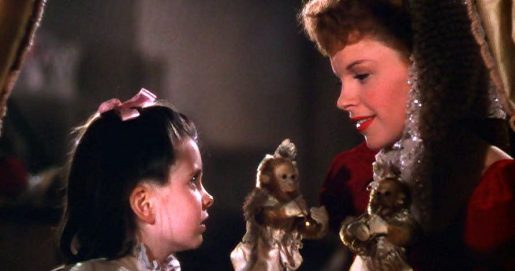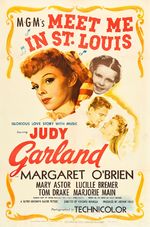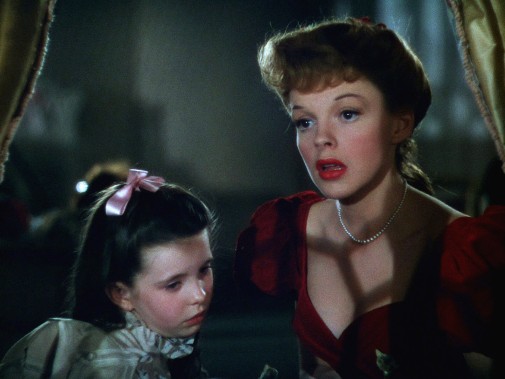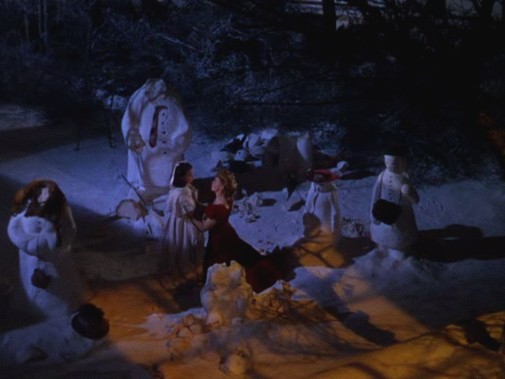
The first time I remember hearing "Have Yourself a Merry Little Christmas" was in The Holiday. That 2006 picture has become something of a Christmas mainstay over the years and, while I'm not its biggest fan, I can't help but feel grateful for it. After all, it introduced me to my favorite Christmas song. Written by Hugh Martin and Ralph Blane in 1943, "Have Yourself a Merry Little Christmas" has cinematic origins despite some of its best-known version having little to do with cinema. Long before Sam Smith, Florence Welch, Frank Sinatra, or Ella Fitzgerald sang the holiday classic, this was Judy Garland's song…
Just as the tune is my favorite Christmas song, the film for which it was made, Meet Me in St. Louis, is probably my favorite holiday movie too...
 Only a small portion of the narrative happens during Yuletide, but the focus on family bonds, fraternal love, and parental devotion makes its tone feel appropriate for December celebrations. As an atheist, Christmas is a holiday I enjoy mostly divorced from its religious origins, seeing it as a festivity about treasuring and appreciating our loved ones rather than marking the birth of Christ. It also helps that I adore giving gifts to my friends and family.
Only a small portion of the narrative happens during Yuletide, but the focus on family bonds, fraternal love, and parental devotion makes its tone feel appropriate for December celebrations. As an atheist, Christmas is a holiday I enjoy mostly divorced from its religious origins, seeing it as a festivity about treasuring and appreciating our loved ones rather than marking the birth of Christ. It also helps that I adore giving gifts to my friends and family.
Still, regardless of all that secular merriment, Christmas hasn't always been a jolly occasion for me, even as I paint on a smile and project seasonal mirth. Struggling with depression and suffering through a string of bad relationships, I've spent a lot of the last Decembers trying to hide my tears from those around me, wrapping despondence in glitzy decorations, putting a bow on it, and hoping that it will distract from the darkness within. I think that's part of the reason why I love this particular song so much. It's not a very jolly tune when all is said and done.
When it's sung in Meet Me in St. Louis, the Smith family is living a period of upheaval and melancholy. The patriarch, Mr. Alonzo, has been promoted at his job. The consequences of such good fortune involve the entire family moving to New York, leaving their beloved Missouri home behind, their friends, their loves, their city. On Christmas Eve, after returning from a party, the last she'll enjoy in St. Louis, Judy Garland's Esther comes home to find her little sister, Tootie, distraught. In an attempt at consoling the girl, Esther sings.

She sings about letting their hearts be light, promising that troubles will be out of sight, miles away, just like the happy golden days of yore. Still, here they are, enjoying what's perhaps the last celebration besides faithful friends, gathered as they have so many times before. Even though this sort of happiness may dwindle in the coming years, they'll still be together if the fates allow. Esther goes through conflicting feelings as she sings, acknowledging the fleeting nature of this joy while trying to see silver linings in the dark clouds ahead. It's a melancholic plea for hope, one that understands jubilation tends to walk hand-in-hand with sadness.
So many Christmas songs indulge in unrealistic cheer, speaking so feverously about unbridled glee that the positive feelings start to feel hollow. They're like a shiny ornament, a glass bauble that'll shatter at the tiniest perturbance. "Have Yourself a Merry Little Christmas" doesn't do that. So much so, that, when first confronted with the song, Judy Garland and director Vincente Minelli criticized the work for being too depressing. Hugh Martin revised the original lyrics but the true emotional tonalities of the song still manifest in Garland's rendition.
Like most great musical actors, she performs the number as an internal monologue exteriorized, making us feel how Esther is singing as much to herself as to her sister. Tootie's reaction also serves as a stark acceptance of the song's intrinsic conflict. As played by Margaret O'Brien, the girl isn't consoled but further distraught by the beautiful song, understanding, like so many children, the meaning behind the words. She knows her sister's hope is born out of an expectation of misery, and so she flees to destroy the snowmen in the garden.
Little Tootie bludgeons them, collapsing the icy facsimile of the Smith family, letting out her rage at a situation she has no control over. As the score swells in a beautiful melody, the images paint a blue picture. Still, by the end, the family gets together, resolute to face the incoming hurdles together and enjoy this last Missourian Christmas. In the end, all ends well and the Smiths don't go to New York, but, after everything we see, it's easy to suppose they'd still be fine if the trip had gone through. As long as they remain together, there's hope and that's the greatest Christmas miracle of them all.

2020 has been awful beyond belief, but, curiously enough, I feel lighter this December than I have in years. I'm sorry if that's callous, but it's also true. After admitting my problems, opening up to my loved ones, seeking help, ending toxic relationships, and licking my wounds, I feel like I'm about to have a merry Christmas where my joy won't be a performance. Acknowledging the sad part of the holiday, of life, has helped me to find this melancholic sort of mirth and I treasure it, just as I treasure my family, my friends, all those I love and with whom I share this Christmas, even if at a distance.
As I listen to "Have Yourself a Merry Little Christmas" for the umpteenth time I can't help but think my younger self knew something I took a long while to acknowledge when he grew obsessed with the tune. That sadness is part of the joy, they are both necessary. That, to have a merry Christmas, one has to be willing to share the pain as much as the gift-wrapped treats. Pardon the schmaltz, the corny sentimentalism, but, to every reader, I say: have yourself a merry little Christmas and very happy holidays. Next year, may our troubles be out of sight.